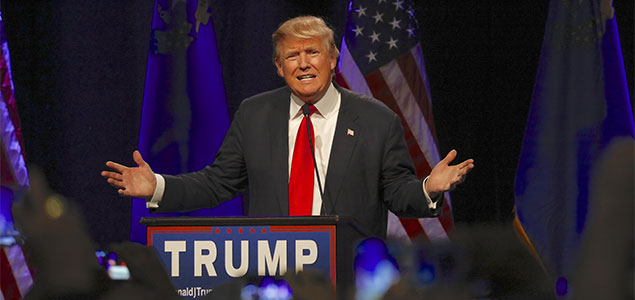By Jack Keough
Diversified industrial/electrical manufacturer Eaton doesn’t seem concerned about President Donald Trump’s criticism of the company moving its headquarters from Cleveland, Ohio to Dublin, Ireland, which has a lower corporate tax rate than the U.S.
In a a speech during the presidential election, Trump criticized Eaton, Carrier, and Ford as well as several companies for moving some facilities and plants to other countries.
But in a recent interview with CNNMoney (cnnmoney.com) Eaton’s Chairman and CEO Craig Arnold defended his company’s decision to expand globally.
The U.S. has only “5 percent of the world’s population,” explained Arnold, who took over last June after Alexander M. “Sandy” Cutler retired. “If you take the long-term view, the better growth opportunities lie outside of the U.S. — despite what may happen in the short-term,” Arnold said.
Arnold added that even if Trump and the Republican-led Congress change tax laws that would allow U.S. firms to pay a lower rate if they brought back cash overseas to America, he has no plans to move Eaton’s headquarters back to Ohio.
“The future of U.S. tax policy is a big uncertainty,” he said in the interview, adding that, based on current proposals he’s seen “there is no reason to re-invert the company. Plus, we pay taxes on all our U.S. income.”
Eaton moved its corporate headquarters after its huge $11.8 billion purchase of electrical equipment manufacturer Cooper Industries in 2012. Cooper had been headquartered in Ireland since 2009 and previously in Bermuda.
When Eaton announced the deal, the company emphasized the tremendous synergies the two companies would generate. In addition, the tax benefits were expected to save the company about $160 million a year.
Ireland’s corporate tax rate is 12.5 percent while the top corporate tax rate in the U.S. is 35 percent, the largest in the world.
Trump has indicated he might implement a border tax that would be charged on companies that moved their facilities outside the U.S., make products there and then sell them in the U.S.
Richard H. Fearon, Eaton’s vice chairman and CFO, said in a Q4 earnings call with analysts that it is impossible to know what changes there will be in the U.S. because of a new tax policy.
“Without knowing the exact policy changes, if the policy that came in was something along the lines of a border adjustment tax, we believe the impact on us would not be significant, since we are balanced if you total up our imports,” he said.
“And we’ve recently been looking in some detail at this just to make sure we fully understand the numbers,” he said.
“But we’re balanced when you total up the imports versus our direct and indirect exports. When I say indirect, we make a lot of parts that go into other assemblies, other people’s products that are then exported. And so we believe the way it would come out, we would likely be able to get an offset for all of those exports,” he said, according to a transcript of the call as provided by seekingalpha.com.
Eaton has been heavily involved in restructuring efforts the past few years. The company’s restructuring costs in Q4 were $90 million, up $66 million from its prior guidance. Those numbers represent an acceleration of approximately $70 million of restructuring actions that were previously planned for Q1 2017 into Q4. In all, Eaton has spent more than $200 million in restructuring.
The restructuring activities, which include many layoffs and more than 10 plant closings, were particularly significant in the company’s Hydraulics and Electrical Systems and Services businesses, where markets have been weakest, and in Electrical Products.
Just last month, Eaton said it would close a plant in Hutchinson, Kansas by October, with 100 employees losing their jobs. And in November it said it was closing a plant in Spencer, Iowa, with 140 jobs lost.
Revenues for Eaton’s Q4, which were announced February 2, were flat year on year, up 1 percent organically as weakness in industrial markets continues. The company said lighting was one area in which Eaton saw substantial growth.
“We did have another what we think is a strong quarter in lighting in Q4,” Arnold said. “Our actual revenues were up mid-single digits, and our LED sales, as a percentage of overall sales, came in at 72 percent.”
“The LED penetration continues to grow,” he said.
Eaton expects residential lighting this year to be up mid-single digits while industrial controls will be down low single-digits. The company forecasts Electrical Systems and Services to see another year of decline as a result of weak large-project activity and ongoing reductions in oil and gas.
Eaton describes itself as a diversified industrial manufacturer of power management technologies, including electrical, hydraulic and mechanical power. Its products are used in mining, oil, solar, wind, other electrical systems, agricultural equipment and large trucks.
Arnold also indicated he has no plans to sell any of its businesses.
“We have today a collection of businesses that we like. We fully intend to continue to invest in all of them. We have no intentions to spin any of our businesses, and so for us, we’re not spending even a moment thinking about it,” he said.
To convince the U.S. government to sign off on the Cooper acquisition and the headquarters switch, Eaton agreed to refrain from tax-free spinoffs of businesses to Eaton shareholders until 2017, the Wall Street Journal has reported.
Company officials also have pointed out that employment has actually grown since the acquisition. It now has 95,000 employees, up from about 75,000 before the Cooper acquisition. Its products are sold in some 175 countries and total revenue is nearly $20 billion.
—
Keough was the editor of Industrial Distribution magazine for more than 26 years. He often speaks at industry events and seminars. He can be reached at john.keough@comcast.net or keoughbiz@gmail.com.
Tagged with Eaton, Exclusive Feature, lighting, tED, Trump






